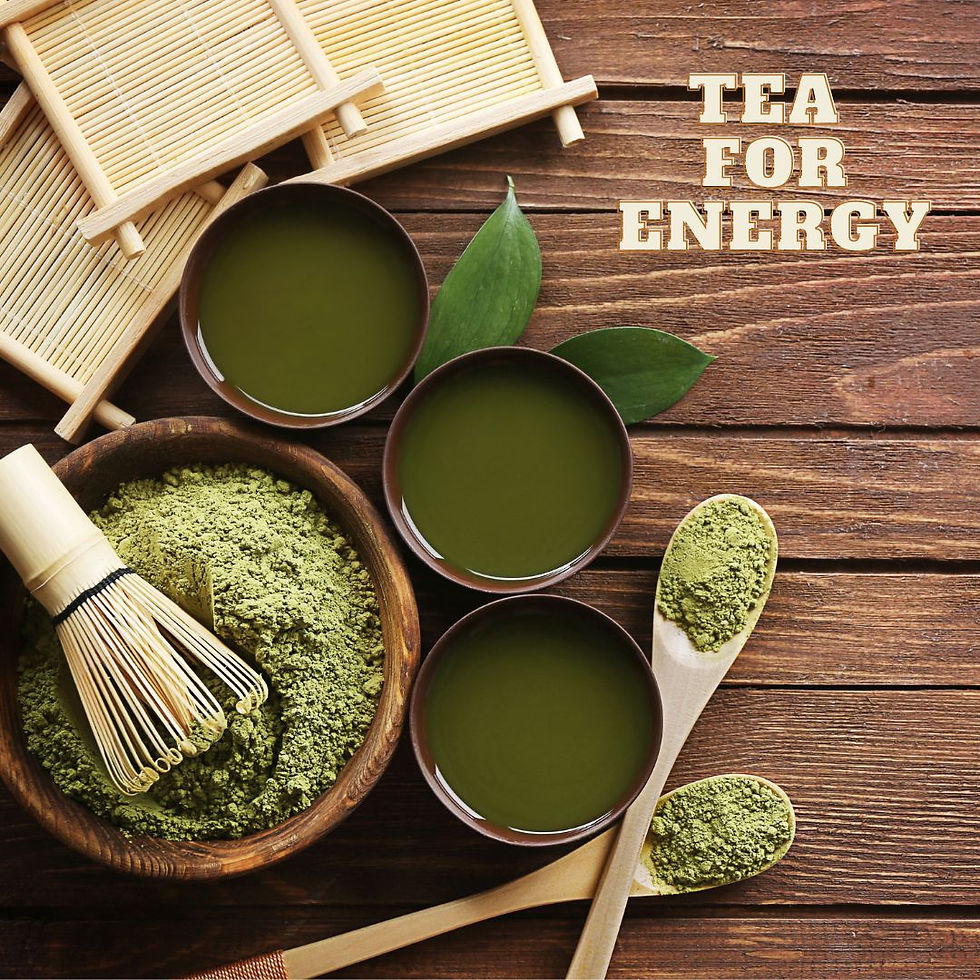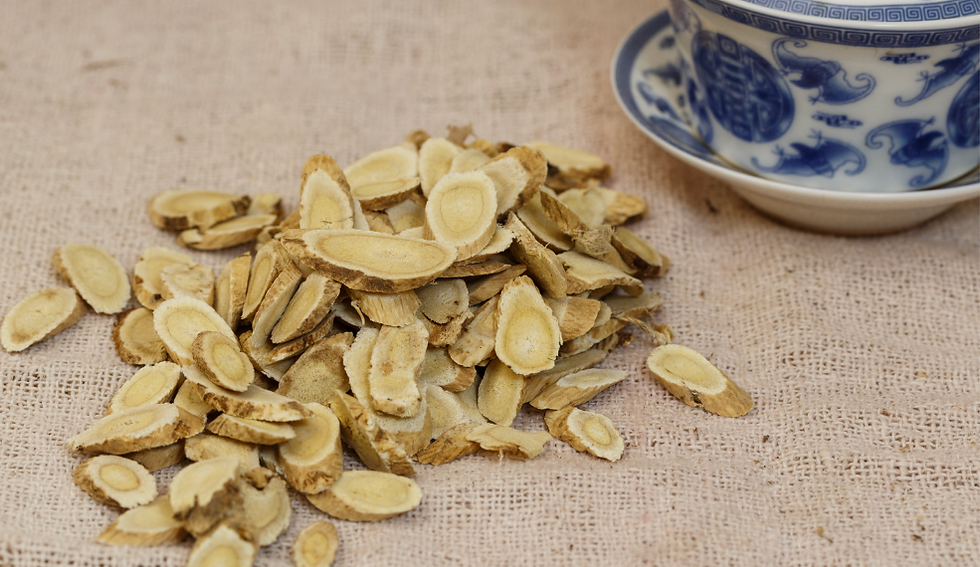Revitalize Your Day: Discover the Best Herbs for Energy Tea!
- Mar 27, 2024
- 11 min read
Updated: Apr 25, 2025

In every culture and every continent people have used herbs to increase energy since the beginning of time.
The most popular world wide are coffee and tea, but there are many more.
Most people believe these plants give us energy, but the truth is that they don't give us anything; they only stimulate what we already have in our bodies.
We feel full energized when our body is working properly, when our digestive system is absorbing what we need and eliminating toxins, and when our heart is pumping blood effortless and efficiently, etc.
If we feel tired it is because our adrenals are exhausted, and drinking stimulants will only make us feel a false sensation of energy and a big crash later.
We'll discuss in this article which are the best herbs for energy tea and what is the best way to recharge our batteries in a natural way with Chinese Medicine.
Most Popular Tea For Energy
Everybody enjoys a cup of tea or coffee with friends, to feel awake in the morning or to get ready to work. These herbs offer a myriad of benefits, including increased alertness, improved mental focus, and enhanced physical stamina. In this article, we will explore some of the most popular energy herbs and their properties . From traditional herbs used for centuries to newly discovered potent plants, let us delve into the world of nature's energy boosters.
1. Green Tea

Green tea accounts for approximately 20% of global tea consumption.
Green Tea Health Benefits:
- It contains powerful antioxidants (polyphenols) that reduce the risk of chronic diseases like heart disease and certain types of cancer.
- Promotes weight loss by boosting metabolism and fat oxidation, making it a popular choice among those seeking a healthier lifestyle.
-It is known for protecting the brain from aging, Epidemiological studies have suggested that daily intake of green tea suppresses age-related cognitive decline.
- Green tea helps to reduce blood sugar, indicated by some randomized controlled trials.
- Increase longevity. In many countries in Asia it is believed that green tea makes you live longer, and as well many studies suggest this.
How Is Green Tea Made?
Green tea is made from the leaves of the Camellia Sinensis plant and is unoxidized. The leaves are plucked, slightly withered, and then cooked immediately to maintain their green quality and prevent oxidization.
Green teas have a higher concentration of chlorophyll, polyphenols, and antioxidants compared to other teas. Leaves are typically harvested three times a year, with the first flush producing the best quality leaves. The heating process of green tea varies depending on the region and the techniques of the tea maker.
While green tea does contain caffeine, it has a lower caffeine content compared to coffee or black tea. This makes it a suitable choice for those looking to reduce their caffeine intake.
Most Popular Kind of Green Tea:

1- Jasmine:
The tea leaves are harvested in the spring and stored until early summer when the jasmine flowers bloom. The freshly picked jasmine flowers are left overnight with the tea leaves to infuse them with their fragrance as they open. This process is repeated multiple times, resulting in tea with a robust jasmine scent and taste.
It has 25 mg of caffeine as cup of coffee, 1/4 of coffee

2- Sencha:
Sencha is a Japanese green tea made from the upper leaves of the Camellia sinensis tea bush. It has a mild grassy flavor with hints of sweetness, and is just one variety of Japanese teas, alongside genmaicha and kabusecha.
It has 75mg of caffeine per cup, while coffee has 80 mg, almost the same.
3- Matcha:

Matcha is made from shade-grown tea leaves, a process that involves protecting tea bushes from the sun and filtering light to them in a controlled manner. Shading increases chlorophyll production, resulting in a rich green color. The reduced sunlight affects the plant's photosynthesis, leading to changes in caffeine, flavanols, sugars, antioxidants, and theanine levels.
Matcha tea can have until 70 mg of caffeine while coffee usually has 80mg.
4- Oolong Tea:

Oolong tea is made from the Camellia Sinensis plant, but is fermented for longer than green tea.
Oolong tea is a traditional Chinese tea that is partially fermented before being dried and rolled, resulting in a flavor profile that falls between green and black tea.
It contains approximately 50-75 mg of caffeine per cup, which is slightly higher than green tea and slightly lower than black tea.
2. Ginseng

Ginseng is a highly regarded herb known for its energy-boosting properties and numerous health benefits. Originating from Asia, this powerful root has been used for centuries in traditional medicine.
Ginseng is widely recognized as an adaptogen, a substance that helps the body adapt to physical and mental stress. This herb aids in enhancing physical performance by increasing endurance, reducing fatigue, and improving overall energy levels.
Regular consumption of ginseng has been shown to enhance cognitive function, focus, and concentration. It can even help reduce mental fatigue and improve overall mood.
The key to ginseng's energy-boosting effects lies in its active compounds called ginsenosides. These bioactive compounds stimulate the central nervous system, promoting increased energy production and alertness.
In conclusion, ginseng is an exceptional herb with remarkable benefits for physical and mental performance. Its role as an adaptogen makes it an excellent choice for individuals seeking a natural energy boost and improved overall well-being. Incorporating ginseng into your daily routine can help you achieve optimal physical and mental performance, especially if you are depleted. However, ginseng is a powerful herb that may not be appropriate for people with heart conditions or some other constitutional issues.
It is advisable to seek out a good herbalist who can give you an accurate diagnosis before taking this herb.
3. Astragalus
Astragalus or Huang Qi, is a powerful herb commonly used in Traditional Chinese Medicine (TCM) for its numerous health benefits. One of its primary uses is in treating fatigue.
Astragalus is native to China, Mongolia and North Korea, and is an ancient component of Traditional Chinese Medicine (TCM).

The herb was mentioned in the Divine Husbandman's Classic of the Materia Medica, a text written during the first century AD and attributed to the teachings of Shennong, a legendary figure believed to have lived around 5,000 years ago.
Astragalus is known for supporting immune health and the body's immune defenses. It is also used in Traditional Chinese Medicine as an adaptogen to help boost energy and resistance to stress.
As an adaptogen, astragalus helps combat stress by regulating the body's response to it. It aids in reducing fatigue caused by prolonged stress and restores energy levels. This adaptogenic herb works by supporting and balancing the body's overall energy system, known as Qi in TCM.
In TCM, fatigue is often seen as a sign of Qi deficiency or stagnation. Astragalus helps to replenish and invigorate Qi, providing a natural remedy for these symptoms. By nourishing the body's Qi, astragalus increases energy levels and supports overall vitality.
Moreover, astragalus has immune-modulating properties, which further contribute to its fatigue-fighting capabilities. It helps strengthen the immune system, protecting against infections and diseases that can lead to tiredness and fatigue. However you should not take astragalus once you have already contracted an infection; it should be used as a preventative rather than a treatment for infection.
4. Guarana

Guarana, a highly popular herb, originated in the heart of South America, specifically
the Amazon rainforest. It is widely renowned for its remarkable caffeine content, surpassing that of coffee. This unique herb is a go-to energy booster, favored by many due to the immediate burst of energy it provides.
Within the Amazon rainforest, guarana has been historically used by indigenous tribes for its invigorating properties. Owing to its high caffeine content, guarana delivers an intense energy kick that surpasses that of coffee. When consumed, guarana stimulates the central nervous system, enhancing alertness and promoting a feeling of wakefulness.
The secret behind guarana's effectiveness can be attributed to its potent caffeine content. Caffeine acts as a stimulant, inhibiting adenosine receptors in the brain, thus preventing drowsiness and promoting a state of heightened awareness. Compared to coffee, guarana acts faster, providing an almost immediate energy boost. This quick burst of energy makes it an attractive choice for those who need an instant pick-me-up.
5. Coffee
Coffee is a popular beverage consumed worldwide, it is known for its unique taste and invigorating effects. In addition to its appealing flavor, coffee offers several notable health benefits:

- It may reduce the risk of developing dementias: Recent studies have shown that women over the age of 65 who consume two to three cups of coffee daily have a lower risk of developing dementia.
- It might be good for your Liver: Studies have indicated that individuals who consume coffee are more likely to have healthy liver enzyme levels compared to non-coffee drinkers.
- Reduce Parkinson incidence: A new study from the National Neuroscience Institute in Singapore says that drinking coffee containing caffeine can significantly reduce the risk of Parkinson’s disease.
- Coffee might protect the heart: Research has indicated a possible link between frequent coffee consumption and a reduced likelihood of developing hypertension, heart failure, and atrial fibrillation.
- Coffee Reduces risk of cancer: Multiple studies indicate that consuming coffee may lower the risk of cancer.
- Probably people with higher coffee consumption levels had a lower risk of stroke: Studies have shown that coffee consumption can lower the risk of stroke, particularly ischemic stroke.

One of the key components of coffee is caffeine, a natural stimulant that provides an energy boost. The caffeine content in coffee can vary depending on the brewing method and type of coffee beans used. On average, a cup of coffee contains around 95 milligrams of caffeine, which can help improve alertness and focus, and may enhance physical performance.
However, it is important to be aware of the potential drawbacks associated with coffee consumption. Excessive intake of caffeine can lead to increased heart rate, disrupted sleep patterns, and even anxiety in some individuals. Additionally, coffee may cause stomach irritation or acid reflux in those prone to digestive issues.
3. Black tea
Black tea is one of the most consumed beverages in the world.
It is made from the leaves of the Camellia Sinensis plant, which are fully oxidized before being dried and processed. This process gives black tea its characteristic dark color and bold flavor.

Black tea originated in China thousands of years ago and was later introduced to other parts of the world, including India, Sri Lanka, and Kenya. Other true teas include green tea, which is made from the unoxidized leaves of the Camellia Sinensis plant, and oolong tea, which falls somewhere between black and green tea in terms of oxidation levels and flavor profiles.
Black Tea Benefits:
- Improve Focus: Black tea has caffeine; approximately half the amount found in coffee. Additionally, it contains an amino acid called L-theanine. This combination can improve alertness and focus. Unlike the jittery energy from caffeine alone, the presence of L-theanine in black tea provides a more stable and balanced energy boost.
- It may decreases the risk of some cancers: Researchers have found that the polyphenols in tea do play a role in fighting certain types of cancer
- It might reduce the risk of stroke: Research indicates that consuming two or more cups of tea per day may lower the risk of stroke by 16% in comparison to those who do not consume tea.
- Black tea has the possibility to promote Heart health: these components of Black Tea, theaflavins help to lower blood cholesterol, and flavonoids reduce the risk of heart disease by 8%.
- It lowers blood sugar levels: Research indicates that black tea can improve blood sugar levels in normal and pre-diabetic adults following meals.
Most popular Black Tea:
- Darjeeling Black Tea
Darjeeling tea is grown in the Himalayas at altitudes of nearly 1000 meters or more, resulting in a refined and subtle flavor due to the high elevation, air, and soil quality.
Darjeeling tea is known for its high-quality flavor, aroma, and overall quality, leading to its nickname as the "Champagne" of tea.
- Earl Grey
Earl Grey is one of the most famous teas in the world. This classic British tea is Darjeeling black tea flavored with oil from the rind of bergamot orange, a citrus fruit with the appearance and flavor somewhere between an orange and a lemon with a little grapefruit and lime thrown in.
- Ceylon Black Tea:
Ceylon tea is made in Sri Lanka, which was previously known as Ceylon. The country's diverse elevation, climate, soil type, plant varietals, and weather contribute to the wide range of flavors and characteristics found in its teas.
- English Breakfast Tea:
English Breakfast tea is a blend of different types of black tea, including Assam, Ceylon, Kenyan, and Keemun. Each type contributes its own unique flavor profile, resulting in a multi-layered taste experience.
Better Herbal Approach to Improve Your Energy: Chinese Medicine

Chinese medicine has thousands of years of evolution. Originally, it was created by Daoist, ancient Chinese religion which goal was to live in harmony with Nature and to achieve the longest and healthiest life possible.
Chinese Medicine is the original BioHacking.
We will feel the most energy, not after taking an stimulant, but when our body is working in harmony, when our digestion is most efficient, when our Heart is pumping blood effortlessly, when we have a deep and restful sleep: when we are healthy. That is the goal of Traditional Chinese Medicine.
Custom Herbal Formula
Most Chinese herbs have been used for thousands of years, while most Western drugs have been in the market for less than 50 years.
The Chinese herbalism uses the synergetic effect of multiple components from different herbs to achieve the best effect in our bodies with the minimum side effects.
Creating a custom herbal formula is a personalized and intricate process. By understanding the individual's needs, the therapeutic properties of various herbs, and carefully balancing the proportions, an effective and personalized formula can be achieved.
When our body is in balance and every organ working in harmony, we will feel our most potential, physically, energetically and intellectually.
Acupuncture

Acupuncture is an ancient practice that originated in China thousands of years ago.
It is believed that acupuncture stimulates the nervous system to help the body work in harmony.
Acupuncture involves the insertion of thin needles into specific points on the body to restore balance. These points are located along the meridians and correspond to different organs or systems in the body. The needles are inserted at varying depths and may be stimulated by gentle twisting or even by electrical impulses.
The techniques used in acupuncture have been refined over centuries, and today, sterile, disposable needles are used to ensure safety and minimize discomfort. Acupuncture is a relatively painless procedure, with most people describing a mild sensation or tingling.
Acupuncture has been found effective in treating a wide range of health conditions, including chronic pain, digestive disorders, migraines, and even mental health issues such as anxiety and depression. It is often used in conjunction with other forms of therapy, such as herbal medicine or massage.
Nutrition
One of the most important aspects of our health is what we eat. Nutrition represents an inspiring therapy.
The right type of quality food, when digested thoroughly, benefits the biochemistry of our bodies and especially that of our brain function.
Positive nutrition enhances the well being of mind in general, including how we think and feel, and provides us with the proper energy that we need.
SAD diet (Standard American Diet) is a profitable business model, but is not necessary the most healthy option for us neither for the environment.
We should turn back to a healthier traditional diet.
In Chinese medicine, we know that every food has its own characteristics, and depending on our particular constitutions and circumstances, they can nourish us or harm us.
"Let the food be your medicine"
Soul Acupuncture & Herbal
We are a team of Acupuncture Physicians, with extensive training and experience in Chinese Herbal Medicine, Acupuncture and Nutrition.
In both Chinese Herbs and Acupuncture, we have been trained by world class Taiwanese masters: in schools of Acupuncture and Herbalism, the Taiwanese styles are the most respected in Asian countries.
Our Acupuncture Physicians have expert Medical Pulse Diagnosis skills, allowing us to make accurate diagnoses for our herbal and acupuncture patients: essential to providing the best treatment possible for each patient.
Please contact us to learn more about what Chinese Medicine can do to improve your energy and your health!
*This article is ment to educate and not for diagnosis or treatment, alway contact your primary care provider.




Comments